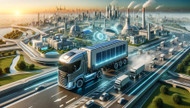The Future of Heavy-Duty Trucking: Embracing Advanced Technology for Sustainability
Posted by: Duaparts on

In the evolving landscape of transportation and logistics, heavy-duty trucks are undergoing a significant transformation. The latest trends in truck parts and technology are not just about enhancing performance and efficiency; they're also focused on sustainability and reducing the environmental impact of freight operations.
Integrating Advanced Technology and Sustainability
The future of heavy-duty trucking is vividly illustrated by the integration of advanced technological parts, as seen in the envisioned futuristic cityscape where trucks equipped with cutting-edge technology navigate through bustling streets. These vehicles boast sleek designs, incorporating solar panels, aerodynamic features, and electric powertrains, setting a new standard for the industry.
Solar Panels and Renewable Energy
One of the key trends in heavy-duty truck parts is the adoption of solar panels and renewable energy sources. Trucks are now being equipped with solar panels not just for auxiliary power needs, such as running air conditioning or charging batteries, but also to contribute to the main propulsion system. This shift towards renewable energy sources is crucial in reducing carbon emissions and dependency on fossil fuels.
Aerodynamic Enhancements
Aerodynamics play a vital role in increasing fuel efficiency and reducing emissions. The latest trucks are designed with enhanced aerodynamic features, including streamlined shapes and specialized parts like side skirts and roof fairings, which help to minimize air resistance. These improvements can lead to significant savings in fuel consumption and cost, making them a critical trend in the industry.
Electric Powertrains: The Road to Zero Emissions
Electric powertrains are at the forefront of the move towards zero-emission heavy-duty trucks. With advancements in battery technology and electric motors, trucks are now capable of covering longer distances on a single charge, making electric vehicles (EVs) a viable option for freight transportation. The adoption of electric trucks is supported by the development of charging infrastructure and incentives for clean energy vehicles.
Smart Technologies for Efficiency and Safety
The incorporation of smart technologies into heavy-duty trucks is enhancing both efficiency and safety. Systems like advanced driver-assistance systems (ADAS), telematics, and autonomous driving technologies are becoming more prevalent. These technologies not only improve the driving experience but also contribute to safer roads and reduced operational costs.
The Impact on the Industry and Environment
The shift towards advanced technology and sustainability in heavy-duty trucks has a profound impact on the industry and the environment. By reducing emissions and improving fuel efficiency, these trends contribute to cleaner air and a healthier planet. For businesses, the adoption of these technologies can lead to lower operating costs and improved competitiveness in a market that increasingly values sustainability.
In conclusion, the future of heavy-duty trucking is bright, with a clear focus on integrating advanced technology and sustainability. As depicted in the futuristic cityscape, the industry is moving towards a more eco-friendly and efficient future, promising not only to transform how goods are transported but also to contribute to a sustainable world.
This vision of the future encapsulates the trends and innovations driving the heavy-duty trucking industry forward, showcasing a path towards efficiency, safety, and environmental responsibility.

